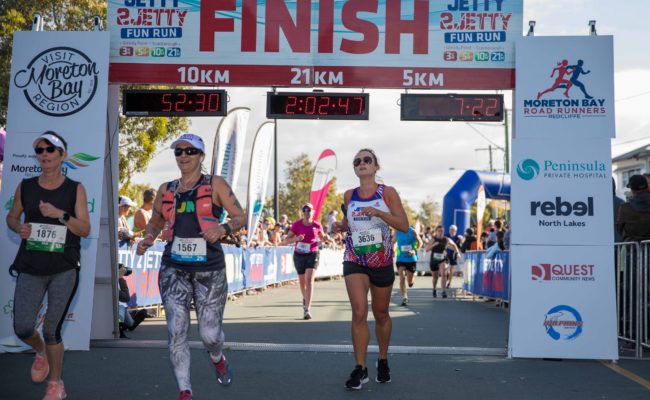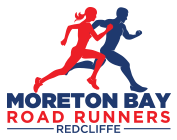10km Training Plan
Congratulations for setting the goal of completing a 10km run in the Jetty 2 Jetty Fun Run.
Following a training plan in the lead up to the race will help to keep you on track as well as ensuring you don’t burn out or over-train
Read on to find a 8 week training plan and tips to keep you on track to your goal.
8 Week Training Plan - 10km for beginners
|
Mon |
Tues* |
Wed** |
Thurs |
Fri |
Sat*** |
Sun |
Week 1 |
Rest |
Run 15 mins, walk 1-2 mins, Run 15 mins |
Rest or Cross Train |
Run 15 mins, walk 1-2 mins, Run 15 mins |
Rest |
Run 20 mins |
Cross Train |
Week 2 |
Rest |
Run 18 mins, walk 1-2 mins, Run 18 mins |
Rest or Cross Train |
Run 18 mins, walk 1-2 mins, Run 18 mins |
Rest
|
Run 30 mins |
Cross Train |
Week 3 |
Rest |
Run 30 mins |
Rest or Cross Train |
Tempo run 5 mins, jog 1 min x 4 |
Rest |
Run 40 mins |
Cross Train |
Week 4 |
Rest |
Run 30 mins |
Rest or Cross Train | Run 30 mins |
Rest |
Parkrun / 5km timed run @80-85% effort |
Cross Train |
Week 5 |
Rest |
Run 30 mins |
Rest or Cross Train |
Run 30 mins progressive run |
Rest |
Run 45 mins |
Cross Train |
Week 6 |
Rest |
Run 30 mins |
Rest or Cross Train |
Tempo run 10 mins, jog 3 mins x 2 |
Rest |
Run 50 mins |
Cross Train |
Week 7 |
Rest |
Run 30 mins |
Rest or Cross Train |
Tempo run 5 mins, jog 90 secs x 5 |
Rest |
Run 45 mins |
Cross Train |
Week 8 |
Rest |
Run 45 mins |
Rest or Cross Train |
Run 25 mins |
Rest |
10/15 min run |
Race Day |
Notes:
Saturday and Sunday sessions are interchangeable
Tempo run - is a faster paced workout also known as a threshold run. Tempo pace is described as "comfortably hard" Tempo/threshold running will help prepare your body for running at a faster pace for longer, as well as boosting what's known as lactate threshold.
Progression run - is a run with structured pace increases from beginning to end. The distance and pace will vary based on your specific training goals.
Cross training is important to keep your fitness improving but reduce running load due to impact on joints and muscle's - examples of cross training, Cycling, Swimming and GYM.
This training plan has been prepared by the Moreton Bay Road Runners

Training Tips
1. If you are new to running, consider getting checked out by your Dr before starting to train. If you are a seasoned runner, consider getting a physio assessment to identify any muscle imbalances, help to ensure you are targeting the right muscles in your training and to help you stay injury free.
2. Get the right shoes. Most shoe manufacturers advise that running shoe lifespan is around 800-1000km. So if you're running around 20-40km/week, this means you should really replace your running shoes every 6 months!! It’s also recommended that you rest your shoes for a couple of days to allow them to recover their protective properties between runs.
3. Stretch in the right way. Before a run, dynamic stretching (leg swings, walking lunges etc.) and after the run traditional stretching (Holding each muscle group in a stretch position for 15-30seconds).
4. Find a good strength and conditioning program which compliments your running program - this will help you with your running endurance and can help to keep you injury free. Your strength and conditioning program does not have to be at the gym, you can do lots of suitable strengthening for running with a simple program at home.
5. Get a good nights sleep. Good sleep is vital for your body to gain the full benefits of training.
6. Keep a training diary. Keep a record of the date, distance, time and how you felt or anything significant that happened on the run.
7. Struggling to stay motivated? Join a running group or find a running buddy. Having someone to run with makes it more fun and can help to keep you motivated on those days you think you’d rather sleep in!
8. Build hills into your training run slowly. There are a couple of hills that feature in the Jetty 2 Jetty course, so we recommend including some in your training so the hills aren't too hard to tackle on race day.
9. Use your longer runs to practice what you'll be doing on race day. For example; hydration, nutrition and what you're wearing.
10. Not sure if this program is right for you? Consider getting a running coach. They can write you an individual program, help to guide your training and race preparation, answer any questions you have about running and take away some of the stress of training for a race.
© 2024 Visit Moreton Bay Region Terms & Conditions Privacy Studio Untitled












